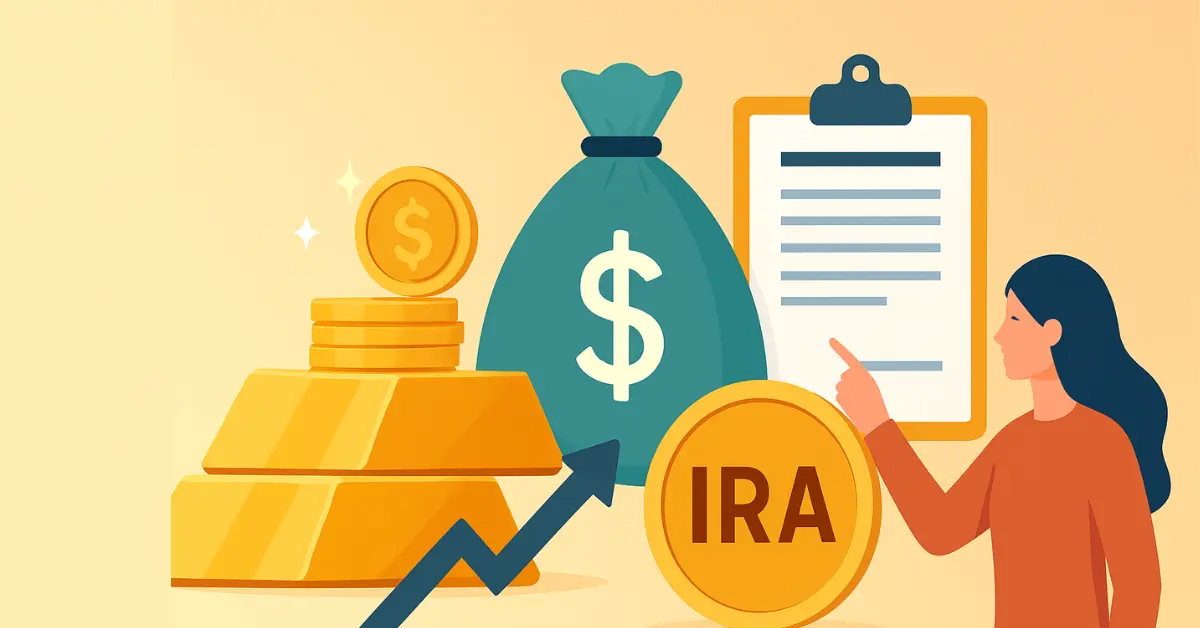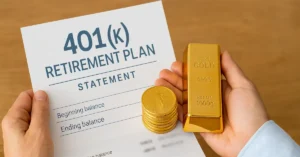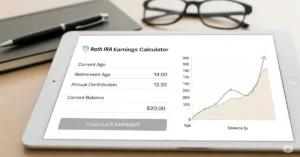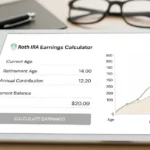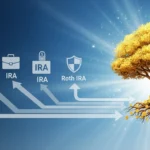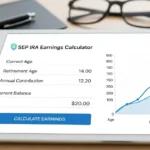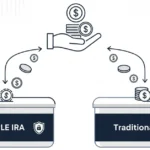As interest in diversifying retirement portfolios with precious metals grows, so does the prominence of Gold IRA companies. These specialized firms facilitate the process of investing in physical gold, silver, platinum, and palladium within the tax-advantaged structure of an Individual Retirement Account (IRA). But have you ever wondered, how do Gold IRA companies make money?
Understanding the revenue streams of these companies is crucial for anyone considering opening a Gold IRA. It allows for a more informed decision-making process, helping you assess the value proposition and compare different providers. This article will delve deep into the various ways Gold IRA companies generate income, providing you with a clear picture of their business model.
The Foundation: Facilitating Your Precious Metals Retirement
Before we dive into the specifics of revenue generation, it’s essential to understand the fundamental services that Gold IRA companies provide. They act as intermediaries, connecting individuals with the complex process of including physical precious metals in their retirement savings. This involves several key steps:
- Account Setup: Assisting clients in opening a self-directed IRA account, which is necessary for holding physical precious metals.
- Rollover/Transfer Assistance: Guiding clients through the process of moving funds from existing retirement accounts like 401(k)s, traditional IRAs, or Roth IRAs into their new Gold IRA.
- Precious Metals Acquisition: Helping clients select and purchase IRS-approved precious metals that meet the required purity and fineness standards.
- Secure Storage: Arranging for the secure, insured storage of these physical metals in IRS-approved depositories.
- Ongoing Account Management: Providing customer support, account statements, and facilitating any future transactions or distributions.
These services form the backbone of their operations, and it’s through the provision of these services that Gold IRA companies generate their revenue. Let’s explore the primary income streams in detail.
1. Account Setup Fees: The Entry Point
Many Gold IRA companies charge a one-time fee to set up a new Gold IRA account. This fee typically covers the administrative costs associated with establishing your account, processing paperwork, and initiating the rollover or transfer of funds. The amount of this setup fee can vary significantly between different providers. Some companies may waive this fee entirely as part of promotional offers, while others might charge a flat rate or a tiered fee based on the initial investment amount.
It’s important to inquire about any account setup fees upfront and understand what they cover. A higher setup fee doesn’t necessarily equate to better service, so compare this cost alongside other factors like annual fees, storage options, and the company’s reputation.
2. Annual Custodian or Maintenance Fees: The Cost of Administration
Similar to traditional IRAs, Gold IRAs typically involve annual custodian or maintenance fees. These recurring fees cover the ongoing administrative costs of managing your account, including record-keeping, compliance, and the generation of account statements. The structure of these fees can vary:
- Flat Fee: Some companies charge a fixed annual fee, regardless of the account balance.
- Percentage-Based Fee: Others charge a percentage of the total assets held in your Gold IRA. This means the fee amount will fluctuate with the value of your precious metals holdings.
- Tiered Fee Structure: Some companies might have different fee levels based on the size of your investment.
When evaluating Gold IRA companies, carefully consider their annual fee structure and how it might impact your long-term returns. A seemingly low setup fee might be offset by higher annual fees over time, and vice versa. Transparency regarding these recurring costs is a hallmark of a reputable provider.
3. Storage Fees: Ensuring the Security of Your Assets
Since the IRS mandates that physical precious metals in an IRA must be held in an approved depository, storage fees are an inevitable component of owning a Gold IRA. These fees cover the cost of securely storing and insuring your gold, silver, platinum, or palladium in a professional, high-security facility.
Storage fees can also be structured in different ways:
- Flat Annual Fee: A fixed fee that covers the storage of your metals, regardless of quantity or value (within reasonable limits).
- Percentage-Based Fee: A fee calculated as a percentage of the value of your stored metals. As the value of your holdings increases, so will the storage fee.
- Per-Ounce or Per-Metal Fees: Less common, but some depositories might charge based on the specific type and quantity of metal stored.
The location and the level of security offered by the depository can also influence storage fees. Reputable Gold IRA companies work with well-established and insured depositories to provide peace of mind to their clients. It’s wise to understand the storage options available and the associated costs.
4. Transaction Fees and Brokerage Spreads: The Cost of Buying and Selling
Gold IRA companies often act as brokers, facilitating the purchase and sale of precious metals on your behalf. This is where transaction fees and brokerage spreads come into play.
- Transaction Fees or Commissions: Some companies charge a direct fee or commission for each purchase or sale of precious metals within your IRA. This could be a flat fee per transaction or a percentage of the transaction value.
- Brokerage Spreads: The “spread” is the difference between the price at which a dealer buys precious metals (the “bid” price) and the price at which they sell them (the “ask” price). Gold IRA companies, like any other precious metals dealer, typically mark up the price when selling to clients and offer a slightly lower price when buying back. This spread represents a profit margin for the company.
Understanding the transaction fees and the typical spreads offered by a Gold IRA company is crucial for evaluating the overall cost of investing. High spreads can significantly impact your returns, especially if you plan to make frequent transactions. Look for companies that offer transparent pricing and competitive spreads.
5. Markups on Precious Metals: Another Source of Revenue
In addition to explicit transaction fees or spreads, some Gold IRA companies may also generate revenue through a markup on the price of the precious metals they sell to their clients. This means they purchase the metals at the wholesale price and then sell them to you at a slightly higher price. While this isn’t always explicitly stated as a “fee,” it’s an inherent part of the business model for many precious metals dealers, including those specializing in IRAs.
It’s challenging for individual investors to pinpoint the exact markup a company is applying, but comparing the prices offered by different Gold IRA providers for the same type of metal can give you a general sense of their pricing competitiveness.
6. Marketing and Educational Material Costs (Indirect Revenue):
While not a direct fee charged to your account, some Gold IRA companies might generate indirect revenue through the sale of educational materials, guides, or subscriptions related to precious metals investing. Additionally, they might have partnerships or affiliate relationships that could generate income. However, the primary revenue streams for most Gold IRA companies remain the fees and spreads directly associated with setting up and managing your account and facilitating precious metals transactions.
The Importance of Transparency and Due Diligence
Understanding how Gold IRA companies make money underscores the importance of transparency when choosing a provider. A reputable company will clearly disclose all fees associated with their services, including setup fees, annual fees, storage fees, and transaction costs or spreads. They should be able to explain their pricing structure in detail and answer any questions you may have.
When researching Gold IRA companies, don’t solely focus on the initial setup fee. Consider the entire cost structure over the long term, including annual fees and potential transaction costs if you anticipate making changes to your holdings.
Choosing a Reliable Partner: The Case of Augusta Gold IRA
Navigating the world of Gold IRAs can feel overwhelming, which is why choosing a trustworthy and transparent partner is paramount. Augusta Gold IRA has established a strong reputation within the industry for their commitment to customer education, transparent pricing, and exceptional service. They understand that building trust is essential, and they achieve this by providing clients with clear information about their fees and the overall process of investing in a Gold IRA.
Many individuals have chosen Augusta Gold IRA for their straightforward approach and dedication to helping investors understand the benefits and potential costs involved in diversifying their retirement savings with precious metals. Their team of knowledgeable professionals can guide you through the rollover process, explain the different types of approved metals, and help you choose the storage options that best suit your needs.
If you’re serious about exploring a Gold IRA and want to work with a company known for its integrity and customer-centric approach, we encourage you to learn more about Lear Capital Gold IRA.
👉 Click here to claim your free kit and explore Lear Capital’s latest offers
Their transparent fee structure and focus on education can provide you with the confidence you need to make informed decisions about your retirement future.
What Value Do You Receive in Return for These Fees?
While understanding the fees is crucial, it’s equally important to consider the value you receive in return. Gold IRA companies provide a specialized service that simplifies the complex process of adding physical precious metals to your retirement portfolio. This includes:
- Expertise and Guidance: Navigating IRS regulations and understanding the nuances of precious metals investing can be challenging. Reputable Gold IRA companies offer the expertise to guide you through the process correctly.
- Streamlined Rollover Process: They handle the complexities of rolling over funds from your existing retirement accounts, minimizing the potential for errors and tax implications.
- Access to IRS-Approved Metals: They provide access to a range of precious metals that meet the stringent requirements for inclusion in an IRA.
- Secure Storage Solutions: They arrange for the secure, insured storage of your physical assets in professional facilities, providing peace of mind.
- Convenience: They handle the logistics of buying, selling, and storing your precious metals within your IRA, saving you significant time and effort.
By understanding the services provided and the associated fees, you can better assess the value proposition of different Gold IRA companies.
Conclusion: How Do Gold IRA Companies Make Money?
Gold IRA companies make money through a combination of setup fees, annual custodian or maintenance fees, storage fees, and transaction costs or brokerage spreads on the buying and selling of precious metals. Some may also have markups on the price of the metals themselves.
As a prospective investor, your responsibility is to conduct thorough due diligence, compare the fee structures and services of different providers, and choose a company that is transparent, reputable, and aligns with your investment goals. Understanding their business model empowers you to make informed decisions and select a partner who will help you navigate the world of precious metals IRAs effectively. Remember to always prioritize transparency and consider the long-term costs and benefits before making a final decision.
FAQ
What are the primary ways Gold IRA companies earn money?
Gold IRA companies make money through a combination of fees and markups. Their main revenue streams include one-time account setup fees, recurring annual custodian and storage fees, and profits from brokerage spreads or markups on the precious metals they sell to you.
What is a “brokerage spread” and how does it affect my investment?
The brokerage spread is the difference between the price at which a company buys a precious metal (the “bid” price) and the price at which they sell it (the “ask” price). This spread is a profit margin for the company. A wider spread means a higher cost for you, which can affect your potential returns, especially if you plan on making multiple transactions.
Why do I have to pay annual custodian and storage fees?
The IRS mandates that all assets in a self-directed IRA, including physical precious metals, must be held by a third-party custodian and stored in an IRS-approved depository. The annual custodian fee covers the administrative costs of managing your account and ensuring it remains compliant, while the storage fee pays for the secure, insured storage of your physical gold or other precious metals.
Are the fees for a Gold IRA always the same?
No, the fee structures can vary significantly among different companies. Some may charge a flat annual fee, while others use a percentage-based or tiered system based on the value of your assets. The specific fees can also depend on the depository you choose. It’s crucial to compare the entire cost structure—not just one single fee—to understand the long-term impact on your investment.
Is Augusta Gold IRA transparent about their fees?
Yes, the article highlights that Augusta Gold IRA has built a reputation for its transparency and commitment to customer education. They are known for providing clients with clear, detailed information about their fee structure and the overall costs involved, helping investors make informed decisions.
What value do I get in return for paying these fees?
The fees you pay provide access to a specialized service that simplifies a complex process. In return, you receive professional guidance on setting up and managing your Gold IRA, assistance with navigating IRS regulations, secure storage of your physical assets, and the convenience of having experts handle the logistics of purchasing and storing your precious metals. This expertise and service are what you are paying for to ensure your investment is handled correctly and securely.
